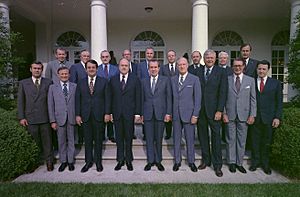Caspar Weinberger facts for kids
Quick facts for kids
Caspar Weinberger
|
|
|---|---|
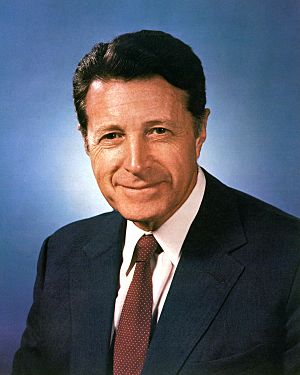
Weinberger in the 1980s
|
|
| 15th United States Secretary of Defense | |
| In office January 21, 1981 – November 23, 1987 |
|
| President | Ronald Reagan |
| Deputy | Frank Carlucci W. Paul Thayer William Taft IV |
| Preceded by | Harold Brown |
| Succeeded by | Frank Carlucci |
| 10th United States Secretary of Health, Education, and Welfare | |
| In office February 12, 1973 – August 8, 1975 |
|
| President | Richard Nixon Gerald Ford |
| Preceded by | Elliot Richardson |
| Succeeded by | F. David Mathews |
| 20th Director of the Office of Management and Budget | |
| In office June 12, 1972 – February 1, 1973 |
|
| President | Richard Nixon |
| Preceded by | George Shultz |
| Succeeded by | Roy Ash |
| Chair of the Federal Trade Commission | |
| In office December 31, 1969 – August 6, 1970 |
|
| President | Richard Nixon |
| Preceded by | Paul Dixon |
| Succeeded by | Miles Kirkpatrick |
| Chair of the California Republican Party | |
| In office 1962–1964 |
|
| Preceded by | John Krehbiel |
| Succeeded by | Gaylord Parkinson |
| Member of the California State Assembly from the 21st district |
|
| In office January 5, 1953 – January 5, 1959 |
|
| Preceded by | Arthur H. Connolly Jr. |
| Succeeded by | Milton Marks |
| Personal details | |
| Born |
Caspar Willard Weinberger
August 18, 1917 San Francisco, California, U.S. |
| Died | March 28, 2006 (aged 88) Bangor, Maine, U.S. |
| Political party | Republican |
| Spouse | |
| Children | 2 |
| Education | Harvard University (BA, LLB) |
| Military service | |
| Branch/service | United States Army |
| Years of service | 1941–1945 |
| Rank | Captain |
| Unit | 41st Infantry Division |
| Battles/wars | World War II |
Caspar Willard Weinberger GBE (August 18, 1917 – March 28, 2006) was an American statesman and businessman. As a prominent Republican, he served in a variety of state and federal positions for three decades, including chairman of the California Republican Party, 1962–1968. Most notably he was Secretary of Defense under President Ronald Reagan from 1981 to 1987.
Weinberger was born in San Francisco, California. He served in the 41st Infantry Division in the Pacific theater of World War II. Weinberger's entry into politics was as a California State Assemblyman from 1953 to 1959, and he would go on to serve as Chairman of the Federal Trade Commission and Director of the Office of Management and Budget under Presidents Richard Nixon and Gerald Ford. An accomplished private sector businessman, he later became vice president and general counsel of Bechtel Corporation, and still later Chairman of Forbes magazine.
Weinberger's tenure as Secretary of Defense was marked by his hard line against the Soviet Union, in disagreement with the State Department. He promoted the Strategic Defense Initiative. He was indicted on charges lying to Congress and obstructing government investigations as part of the Iran–Contra investigation but was pardoned prior to going to trial. Weinberger was awarded both the Presidential Medal of Freedom in 1987 and an honorary British knighthood from Queen Elizabeth II.
Contents
Early life
Weinberger was born in San Francisco, California, the younger of two sons of Herman Weinberger (1886-1944), an attorney, and Cerise Carpenter Weinberger née Hampson (1886-1975), a music teacher, both natives of Denver, Colorado. His father was of Jewish descent from Austro-Hungary, while his maternal grandparents were from Wisconsin. Weinberger was named "Caspar" for a friend of his mother's; his father began calling him "Cap", a nickname that stuck into adulthood.
Weinberger was a first cousin of the nationally broadcast radio personality Don McNeill of Don McNeill's Breakfast Club. Caspar Weinberger's father, Herman, was the younger brother of Luella Weinberger McNeill, mother of Don McNeill. The 1910 Census shows Herman and Luella living in the household of Nathan Weinberger, the grandfather of Caspar Weinberger.
Weinberger's paternal grandparents had left Judaism over a religious dispute while living in Bohemia. He was raised in a home with no denominational ties, though with a socially Christian orientation. Weinberger would later become an active Episcopalian and often expressed his faith in God. Weinberger had stated that his mother's Episcopal religion was "an enormous influence and comfort all my life".
Education
Weinberger attended San Francisco Polytechnic High School. He was academically gifted and gained admission to Harvard University.
When he enrolled at Harvard College, his mother rented an apartment nearby for the first semester that Weinberger and his older brother, Peter, attended Harvard. She then returned to her husband in San Francisco. Weinberger received his Bachelor of Arts in government, magna cum laude, in 1938 and a Bachelor of Laws degree in 1941, both from Harvard. He served as president of the Harvard student newspaper, The Harvard Crimson, and recalls in his memoirs entitled In the Arena: A Memoir of the 20th Century two specific interviews of which he was most pleased: one with the highly decorated soldier Theodore Roosevelt, Jr., and another with Alabama-born actress Tallulah Bankhead.
Prior to commencing studies at Harvard Law School, Weinberger had been offered a scholarship to study at the University of Cambridge.
Career
Military service
He entered the United States Army as a private in 1941, was commissioned as a second lieutenant at the United States Army Officer Candidate School in Fort Benning, Georgia, and served with the 41st Infantry Division in the Pacific. At the end of the war he was a captain on General Douglas MacArthur's intelligence staff. Early in life, he developed an interest in politics and history, and, during the war years, a special admiration for Winston Churchill, whom he would later cite as an important influence in his life. From 1945 to 1947, Weinberger worked as a law clerk for a federal judge before joining a San Francisco law firm.
California politics
In 1952, Weinberger entered the race for California's 21st State Assembly district in the San Francisco Bay area as a Republican at the persuasion of his wife, Jane Weinberger, who also served as his campaign manager. He won and was reelected in 1954 and 1956. As the chairman of the Assembly Government Organization Committee, Weinberger was responsible for the creation of the California Department of Water Resources and was instrumental in the creation of the California State Water Project. Weinberger also unsuccessfully opposed the construction of the Embarcadero Freeway, saying it would ruin the view of the Bay and damage property values. Weinberger felt vindicated when the freeway was removed after the 1989 earthquake. Although unsuccessful in his 1958 campaign for California Attorney General, Weinberger continued to be active in politics and was chosen by Nixon in 1962 to become chairman of the California Republican Party.
Governor Ronald Reagan named him chairman of the Commission on California State Government Organization and Economy in 1967 and appointed him State director of finance early in 1968. Weinberger moved to Washington in January 1970 to become chairman of the Federal Trade Commission. He is credited for having revitalized the FTC by enforcing consumer protection.
Nixon cabinet
He subsequently served under President Richard Nixon as deputy director (1970–1972) and director (1972–1973) of the Office of Management and Budget and Secretary of Health, Education, and Welfare (1973–1975). While serving in the Office of Management and Budget, Weinberger earned the nickname "Cap the Knife" for his cost-cutting ability. For the next five years, Weinberger was vice president and general counsel of the Bechtel Corporation in California.
Secretary of Defense
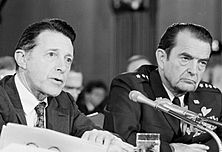
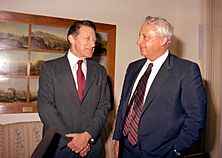
Weinberger was vying for Reagan to appoint him as Secretary of State but was given the position of Secretary of Defense instead.
Weinberger took the lead in implementing a rollback strategy against Soviet communism.
Lemann notes that when he wrote that in 1984, he thought the Reaganites were living in a fantasy world. But in 2016, he says, that passage represents "a fairly uncontroversial description of what Reagan actually did".
Although not widely experienced in defense matters, Weinberger had a reputation in Washington as an able administrator; his powers as a cost cutter earned him the sobriquet "Cap the Knife". He shared President Reagan's conviction that the Soviet Union posed a serious threat to the United States, and that the defense establishment needed to be modernized and strengthened. Belying his nickname, at the Pentagon Weinberger became a vigorous advocate of Reagan's plan to increase the Department of Defense budget. Readiness, sustainability, and modernization became the watchwords of the defense program. In his early years at the Pentagon, Cap Weinberger was known as "Cap the Ladle" for advocating large increases in defense spending.
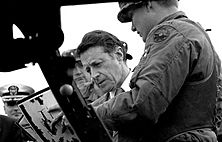
As Secretary of Defense, Weinberger oversaw a massive rebuilding of US military strength. Major defense programs he championed included the B-1B bomber and the "600-ship Navy". His efforts created economic and military-industrial pressures that were associated with the beginning of Perestroika and the beginning of the end of both the Cold War and the Soviet Union. However, this thesis was contested by a study on the causes of the collapse of the Soviet Union by two prominent economists from the World Bank – William Easterly, and Stanley Fischer from MIT: "... the study concludes that the increased Soviet defense spending provoked by Mr. Reagan's policies was not the straw that broke the back of the Evil Empire. The Soviet war in Afghanistan and the Soviet response to Mr. Reagan's Star Wars program caused only a relatively small rise in [USSR] defense costs. The massive US defense effort throughout the period from 1960 to 1987 contributed only marginally to Soviet economic decline."
The same study points out the key reason for the economic decline of the USSR was relying on centrally-planned industrial-expansion to drive economic growth, rather than driving growth by increasing worker productivity via incentives; France and Japan were also mentioned (in 1994) as other centrally-planned economies that could soon experience similar troubles. While the Reagan Doctrine was not a key factor in causing the economic implosion of the USSR, which was driven by internal contradictions, the Reagan proxy-rollback policy of the 1980s (which replaced Détente that Nixon and Carter generally pursued during the 1970s) was the key factor in preventing expansion of the Soviet economic empire, and sustenance of their declining domestic economy from external sources. Reagan was one of the few people to predict this possibility. The final piece of the puzzle was the Soviet leadership: Brezhnev, Andropov, and Chernenko were hardline Communists, and prevented any significant changes, but Gorbachev was a reformer—and once economic reforms and political reforms began, they became unstoppable.
These events came at the cost of helping to triple the US national debt, and funding radicals. Weinberger pushed for dramatic increases in the United States' nuclear funding, and was a strong advocate of the controversial SDI, an initiative which proposed a space- and ground-based missile defense shield.
Weinberger was reluctant to commit the armed forces, keeping only a token force of American marines in Lebanon.
Unlike President Reagan and Secretary of State Shultz, Weinberger did not regard any of Gorbachev's actions—whether it was perestroika or glasnost—as reassuring indicators of his stated intentions. "Not only did Gorbachev give up all of the Soviet 'non-negotiable' demands [regarding the INF Treaty], but he gave us precisely the kind of treaty that the President had sought for seven years. That act of course does not mean—any more than does the Soviet withdrawal from Afghanistan—that the USSR has given up its long-term aggressive designs." Initially, Reagan's views were in line with Weinberger's views, but he began to reevaluate his perception of Gorbachev's intentions in 1987, the year Gorbachev accepted the U.S. proposal on INF.
Weinberger resigned as Secretary of Defense on November 6, 1987.
Iran–Contra affair
The Iran–Contra affair concerned the selling of US missiles to Iran. The funds received from Iran were then channeled to guerilla rebels known as Contras, who were fighting the socialist government of Nicaragua. Such funding had been specifically denied by the US Congress.
Though he claimed to have been opposed to the sale on principle, actually Weinberger participated in the transfer of United States Hawk and TOW missiles to Iran at that time.
Iran–Contra resulted in a major scandal with several investigations which resulted in fourteen Reagan administration officials being indicted.
After his resignation as Secretary of Defense, legal proceedings against Weinberger were continued by Independent Counsel Lawrence E. Walsh. On June 17, 1992, Weinberger was indicted on five felony charges related to the Iran-contra affair, including accusations that he had lied to Congress and obstructed Government investigations. He was defended by defense attorney Carl Rauh.
Prosecutors brought an additional indictment just four days before the 1992 presidential election. This was controversial because it cited a Weinberger diary entry contradicting a claim made by President George H. W. Bush. Republicans claimed that this action contributed to President Bush's later defeat. On December 11, 1992, Judge Thomas F. Hogan threw out this indictment because it violated the five-year statute of limitations and improperly broadened the original charges.
Before Weinberger could be tried on the original charges, he received a pardon on December 24, 1992, from then President Bush, who had been Reagan's vice president during the scandal.
Later career
Weinberger had been Secretary of Defense for six years and ten months, longer than anyone except for Robert McNamara and more recently Donald Rumsfeld. After Weinberger left the Pentagon, he joined Forbes, Inc., in 1989 as publisher of Forbes magazine. He was named chairman in 1993. Over the next decade, he wrote frequently on defense and national security issues. In 1990, he wrote Fighting for Peace, an account of his Pentagon years. In 1996, Weinberger co-authored a book entitled The Next War, which raised questions about the adequacy of US military capabilities following the end of the Cold War.
He was a member of the Founding Council of the Rothermere American Institute at the University of Oxford.
Personal life
In 1942, Weinberger married Rebecca Jane Dalton, who was born on March 29, 1918, in Milford, Maine. A World War II Army nurse, and later author and publisher, she "coaxed her husband ... into politics and was a loyal Washington wife during three Republican administrations before she began to write and publish children's books". Jane Weinberger, a uterine cancer survivor, died on July 12, 2009, aged 91, at Bar Harbor, Maine, following a stroke. The couple had a daughter, Arlin Weinberger, and a son, Caspar Willard Weinberger Jr.
Death
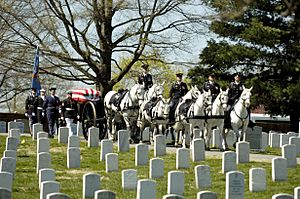
While residing on Mount Desert Island, Maine, Weinberger was treated for and died from complications of pneumonia at Eastern Maine Medical Center in Bangor, Maine, aged 88. He was survived by his wife, their two children, and several grandchildren.
He was buried in Section 30, Grave 835–1 at Arlington National Cemetery on April 4, 2006.
Awards
- Presidential Medal of Freedom in 1987.
- Honorary Knight Grand Cross of the Order of the British Empire in 1988, awarded in recognition for an "outstanding and invaluable" contribution to military cooperation between the UK and the US, particularly during the Falklands War of 1982.
- Weinberger was awarded the Gold Star Award by the International Strategic Studies Association for Outstanding Contributions to Strategic Progress Through Humanitarian Achievement.
- Weinberger was inducted into the United States Army Officer Candidate School Hall of Fame in 1981, the highest honor that can be bestowed on any graduate from the school.
- The Walter F. Patenge Medal of Public Service from the Michigan State University College of Osteopathic Medicine in 1975.
- Golden Plate Award of the American Academy of Achievement in 1975.
See also
 In Spanish: Caspar Weinberger para niños
In Spanish: Caspar Weinberger para niños


